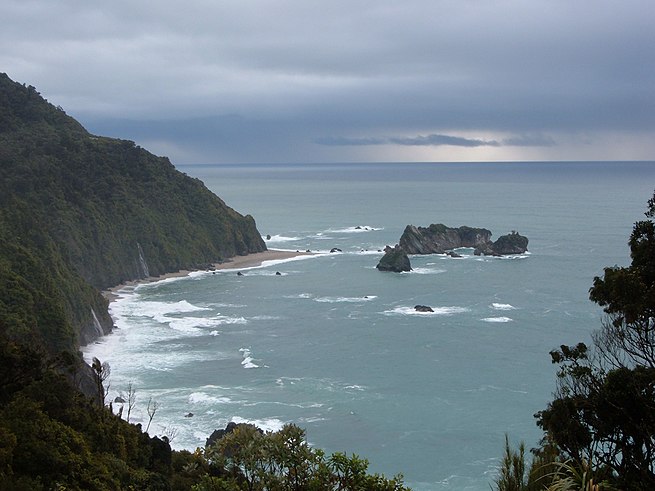
Main Difference
The main difference between Coast and Beach is that the Coast is a area where land meets the sea or ocean and Beach is a area of sand or small stones near the sea or another area of water such as a lake.
-
Coast
The coast, also known as the coastline or seashore, is the area where land meets the sea or ocean, or a line that forms the boundary between the land and the ocean or a lake. A precise line that can be called a coastline cannot be determined due to the coastline paradox.
The term coastal zone is a region where interaction of the sea and land processes occurs. Both the terms coast and coastal are often used to describe a geographic location or region (e.g., New Zealand’s West Coast, or the East and West Coasts of the United States). Edinburgh is an example city on the coast of Great Britain.
The term pelagic coast refers to a coast that fronts the open ocean, as opposed to a more sheltered coast in a gulf or bay. A shore, on the other hand, can refer to parts of land adjoining any large body of water, including oceans (seashore) and lakes (lake shore). Similarly, the somewhat related term stream bed or stream bank refers to the land alongside or sloping down to a river (riverbank) or body of water smaller than a lake. Bank is also used in some parts of the world to refer to an artificial ridge of earth intended to retain the water of a river or pond; in other places this may be called a levee.
While many scientific experts might agree on a common definition of the term coast, the delineation of the extents of a coast differ according to jurisdiction, with many scientific and government authorities in various countries differing for economic and social policy reasons. According to the UN atlas, 44% of people live within 150 km (93 mi) of the sea.
-
Beach
A beach is a landform alongside a body of water which consists of loose particles. The particles composing a beach are typically made from rock, such as sand, gravel, shingle, pebbles. The particles can also be biological in origin, such as mollusc shells or coralline algae.
Some beaches have man-made infrastructure, such as lifeguard posts, changing rooms, showers, shacks and bars. They may also have hospitality venues (such as resorts, camps, hotels, and restaurants) nearby. Wild beaches, also known as undeveloped or undiscovered beaches, are not developed in this manner. Wild beaches can be valued for their untouched beauty and preserved nature.
Beaches typically occur in areas along the coast where wave or current action deposits and reworks sediments.
-
Coast (noun)
The edge of the land where it meets an ocean, sea, gulf, bay, or large lake. from 14th c.
“The rocky coast of Maine has few beaches.”
-
Coast (noun)
The side or edge of something. 15th-18th c.
-
Coast (noun)
A region of land; a district or country. 14th-17th c.
-
Coast (noun)
A region of the air or heavens. 14th-17th c.
-
Coast (verb)
To glide along without adding energy; to allow a vehicle to continue moving forward after disengaging the engine or ceasing to apply motive power.
“When I ran out of gas, fortunately I managed to coast into a nearby gas station.”
-
Coast (verb)
To sail along a coast.
-
Coast (verb)
To make a minimal effort; to continue to do something in a routine way, without initiative or effort.
-
Coast (verb)
To draw near to; to approach; to keep near, or by the side of.
-
Coast (verb)
To sail by or near; to follow the coastline of.
-
Coast (verb)
To conduct along a coast or river bank.
-
Coast (verb)
To slide downhill; to slide on a sled upon snow or ice.
-
Beach (noun)
The shore of a body of water, especially when sandy or pebbly.
-
Beach (noun)
A horizontal strip of land, usually sandy, adjoining water.
-
Beach (noun)
The loose pebbles of the seashore, especially worn by waves; shingle.
-
Beach (verb)
To run aground on a beach.
-
Beach (verb)
To run (something) aground on a beach.
-
Beach (verb)
To run into an obstacle or rough or soft ground, so that the floor of the vehicle rests on the ground and the wheels cannot gain traction.
-
Beach (noun)
a pebbly or sandy shore, especially by the sea between high- and low-water marks
“fabulous sandy beaches”
-
Beach (verb)
run or haul up (a boat or ship) on to a beach
“at the water’s edge a rowing boat was beached”
-
Beach (verb)
(of an angler) land (a fish) on a beach
“he managed to beach a fine trout”
-
Beach (verb)
(of a whale or similar animal) become stranded out of the water
“we don’t know what causes whales to beach”
-
Beach (verb)
leave (someone) at a loss
“competitive procurement seems to have beached several firms”
